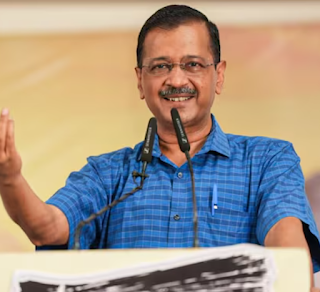On Thursday, a Delhi court granted bail to Chief Minister Arvind Kejriwal in a money laundering case linked to the now-abandoned liquor policy. The decision was issued by Vacation Judge Nyay Bindu of the Rouse Avenue Court, after previously reserving the order earlier in the day.
Following the court's decision, the Enforcement Directorate (ED) requested a 48-hour stay to pursue legal remedies, but the judge denied the request to delay the order.
The ED plans to appeal the bail decision in the Delhi High Court. Consequently, Arvind Kejriwal, leader of the Aam Aadmi Party (AAP), is expected to be released from Tihar Jail on Friday upon paying a bail bond of Rs 1 lakh.
In response to the news, AAP workers celebrated outside the Delhi Chief Minister's residence by lighting firecrackers. AAP Rajya Sabha Member of Parliament Sanjay Singh remarked that Kejriwal's release would "strengthen democracy." Singh criticized the ED's allegations, calling them "baseless and fabricated" and suggesting that the case was politically motivated to entrap Kejriwal.
Video footage from ANI shows AAP workers celebrating outside Kejriwal's residence as the court's decision was announced. The Rouse Avenue Court's decision today to grant bail to CM Kejriwal in the excise policy case required a bond of Rs 1 lakh.
Kejriwal is the second AAP leader, after Sanjay Singh, to secure bail in this case. Meanwhile, former Delhi minister Manish Sisodia remains in Tihar Jail.
Kejriwal's arrest by the Enforcement Directorate occurred on March 21 in a dramatic scene just before the Lok Sabha elections. The Supreme Court had granted him interim bail in May, in light of the general elections, but he surrendered again on June 2.
Arguments During the Hearing
During the hearing, the ED presented its case, claiming to have evidence of Arvind Kejriwal soliciting Rs 100 crore in kickbacks related to the liquor policy. The agency further alleged that these kickbacks were used to finance AAP's election campaign in Goa. Additional Solicitor General SV Raju stated that there was a clear money trail linking proceeds of crime from the South Group, including BRS leader K Kavitha, to the AAP.
ASG Raju also noted that Kejriwal refused to provide his phone's password during the investigation, implying this was a significant factor against granting bail. He mentioned that adverse inferences could be drawn from Kejriwal's refusal, which typically would be grounds for denying bail under standard bail laws, not just under section 45 of the Prevention of Money Laundering Act (PMLA).
The ASG further claimed that Vinod Chauhan, accused in the case, was involved in managing the transfers and postings of Delhi government officials.
Defense's Arguments
Kejriwal’s defense, led by senior advocate Vikram Chaudhary, contested the ED’s allegations, asserting they lacked substantive proof and were speculative. Chaudhary argued that Kejriwal had not been named in any chargesheet filed under the PMLA.
Chaudhary questioned the ED's independence, suggesting the agency might be acting under political influence. He emphasized that there was no evidence to support the claim that AAP received Rs 45 crore, labeling the ED's assertions as hypothetical and prejudiced. Chaudhary also highlighted the ongoing arrests and investigations, while reiterating that there was no concrete evidence of the alleged Rs 100 crore bribe.



